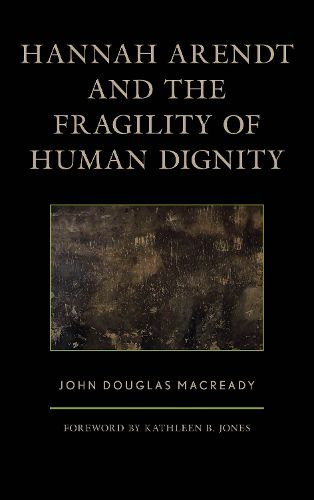Readings Newsletter
Become a Readings Member to make your shopping experience even easier.
Sign in or sign up for free!
You’re not far away from qualifying for FREE standard shipping within Australia
You’ve qualified for FREE standard shipping within Australia
The cart is loading…






Professor John Douglas Macready offers a post-foundational account of human dignity by way of a reconstructive reading of Hannah Arendt. He argues that Arendt’s experience of political violence and genocide in the twentieth century, as well as her experience as a stateless person, led her to rethink human dignity as an intersubjective event of political experience. By tracing the contours of Arendt’s thoughts on human dignity, Professor Macready offers convincing evidence that Arendt was engaged in retrieving the political experience that gave rise to the concept of human dignity in order to move beyond the traditional accounts of human dignity that relied principally on the status and stature of human beings. This allowed Arendt to retrofit the concept for a new political landscape and reconceive human dignity in terms of stance-how human beings stand in relationship to one another. Professor Macready elucidates Arendt’s latent political ontology as a resource for developing strictly political account of human dignity hat he calls conditional dignity-the view that human dignity is dependent on political action, namely, the preservation and expression of dignity by the person, and/or the recognition by the political community. He argues that it is precisely this right to have a place in the world-the right to belong to a political community and never to be reduced to the status of stateless animality-that indicates the political meaning of human dignity in Arendt’s political philosophy.
$9.00 standard shipping within Australia
FREE standard shipping within Australia for orders over $100.00
Express & International shipping calculated at checkout
Professor John Douglas Macready offers a post-foundational account of human dignity by way of a reconstructive reading of Hannah Arendt. He argues that Arendt’s experience of political violence and genocide in the twentieth century, as well as her experience as a stateless person, led her to rethink human dignity as an intersubjective event of political experience. By tracing the contours of Arendt’s thoughts on human dignity, Professor Macready offers convincing evidence that Arendt was engaged in retrieving the political experience that gave rise to the concept of human dignity in order to move beyond the traditional accounts of human dignity that relied principally on the status and stature of human beings. This allowed Arendt to retrofit the concept for a new political landscape and reconceive human dignity in terms of stance-how human beings stand in relationship to one another. Professor Macready elucidates Arendt’s latent political ontology as a resource for developing strictly political account of human dignity hat he calls conditional dignity-the view that human dignity is dependent on political action, namely, the preservation and expression of dignity by the person, and/or the recognition by the political community. He argues that it is precisely this right to have a place in the world-the right to belong to a political community and never to be reduced to the status of stateless animality-that indicates the political meaning of human dignity in Arendt’s political philosophy.